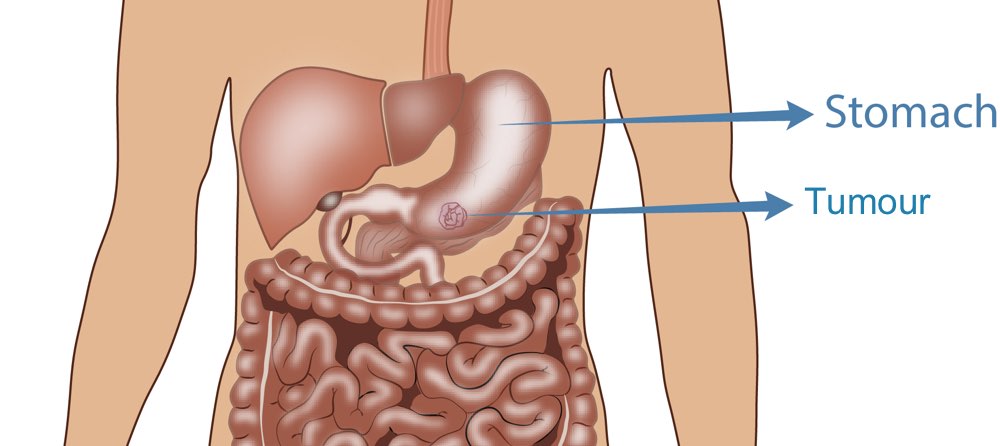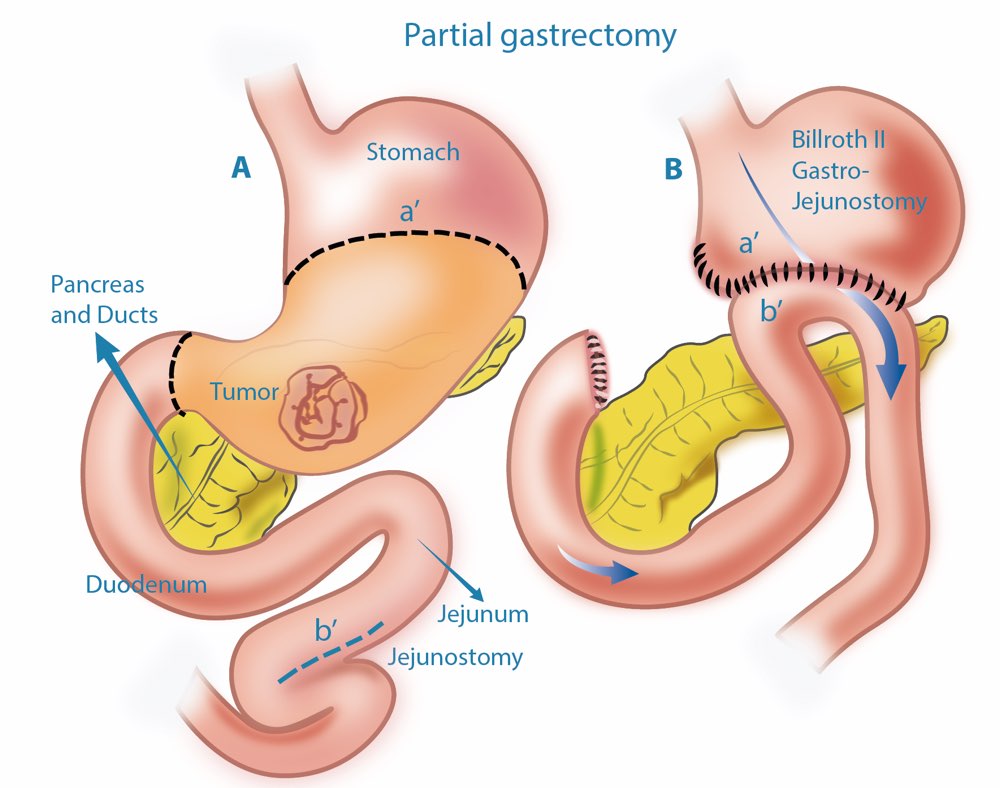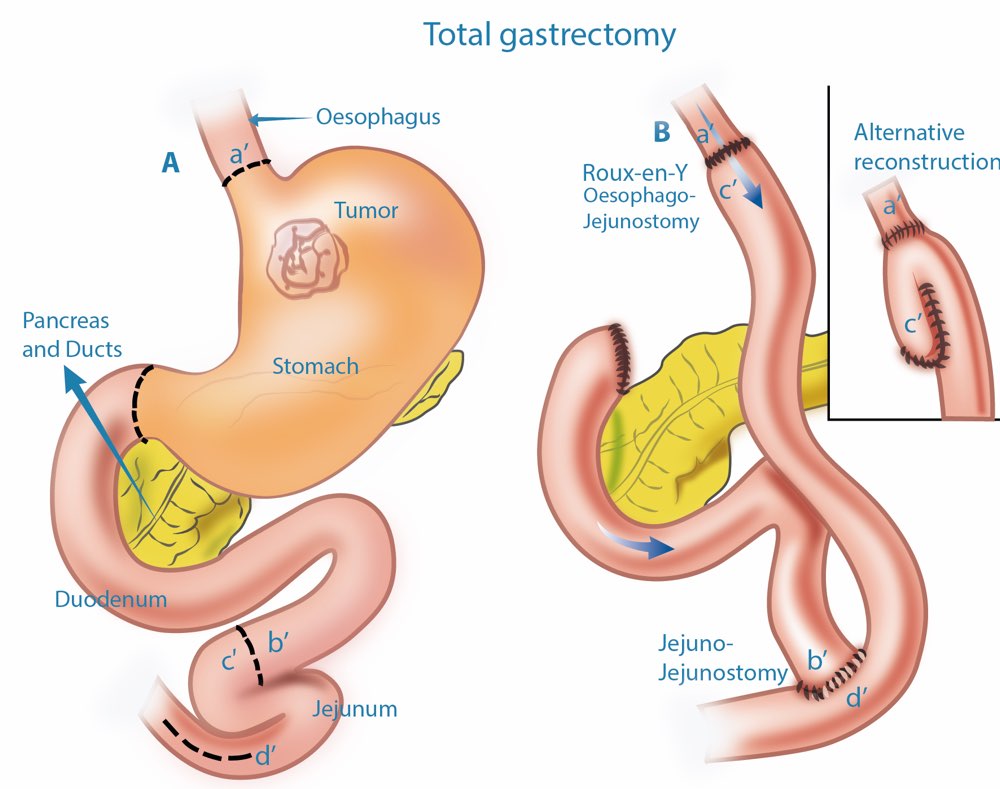Stomach Cancer
If you need treatment for stomach cancer, a gastrointestinal stromal tumour, or a small bowel tumour, you deserve the very best surgery and excellence in care and support. That’s why, at The Surgeons Collective in Perth, we work together as a team of highly qualified and experienced professionals, to give you clear information and to organise your treatment in the most effective and comfortable way. We have listed a comprehensive overview of conditions related to stomach cancer below and we welcome your enquiry if you have any further questions.
What is stomach cancer?
Stomach cancer (also known as gastric cancer) mostly originates in the lining of the stomach wall. We understand that receiving information that suggests you may have stomach cancer, can be a distressing experience, and our team of surgeons and specialist doctors will do everything they can to see you at the earliest convenience, to plan the required tests and to support you with excellent care.
Stomach cancer can be linked to a wide variety of possible causes or risk factors:
- Age, race and gender (more frequent in men)
- Lifestyle habits such as smoking or alcohol, eating lots of preserved foods
- A family history of gastric cancers
- Previous gastric surgery
- Bacterial infections

Whether you have concerns because of certain symptoms, or you have been diagnosed with stomach cancer, our team of experienced surgeons and doctors are here to help. A diagnosis usually involves an endoscopy (a procedure with a flexible camera) and a biopsy. The pathologist may then confirm the diagnosis.
Typical symptoms of stomach cancer include:
- Mild heartburn or reflux, abdominal bloating or pain
- Nausea
- Vomiting
- Vomiting blood
- Change in stool colour to tarry black
- Unexplained loss in appetite and weight loss
- Unexplained lethargy or reduced energy levels
The specialist upper GI surgeons at The Surgeons Collective use their many years of experience to help each individual patient. At The Surgeons Collective we believe that when you receive this type of diagnose you require and deserve the highest standard of surgery and a total commitment to care and support. Our goal is to offer you clear communication around the stage of the cancer, the investigations that are needed and the procedures that are recommended for your treatment.
About Us
At The Surgeons Collective we work as a team of expert surgeons, as well as hepatologists, gastro-enterologists and accredited dietitians.
How is stomach cancer treated?
To plan your treatment for stomach cancer, your specialist doctor will first focus on creating total clarity on the stage of the cancer. Routine tests to determine the cancer stage include:
- A blood test
- A CT scan of the chest, abdomen and pelvis to see if the cancer has spread
- Laparoscopy to determine the location, size and potential spread (under general anaesthetic and done as a day procedure with a maximum of one overnight hospital stay)
At The Surgeons Collective in Perth, it’s our mission to offer you specialised care and treatment, and it starts with a treatment plan that is fully personalised to your situation. The information we gather with these routine tests provides critical information, to help your surgeon make recommendations and decisions around your treatment.
The decision to plan stomach surgery is usually made in consensus between your surgeon, the medical oncologist and other members of a multidisciplinary team. Treatment may include upfront chemotherapy with or without radiation therapy prior to surgery. The aim is to remove part of the stomach (partial gastrectomy) or the entire stomach (total gastrectomy) along with the associated lymph nodes (lymphadenectomy).
To plan your treatment for stomach cancer, your specialist doctor will first focus on creating total clarity on the stage of the cancer. Routine tests to determine the cancer stage include:
- A blood test
- A CT scan of the chest, abdomen and pelvis to see if the cancer has spread
- Laparoscopy to determine the location, size and potential spread (under general anaesthetic and done as a day procedure with a maximum of one overnight hospital stay)
At The Surgeons Collective in Perth, it’s our mission to offer you specialised care and treatment, and it starts with a treatment plan that is fully personalised to your situation. The information we gather with these routine tests provides critical information, to help your surgeon make recommendations and decisions around your treatment.
The decision to plan stomach surgery is usually made in consensus between your surgeon, the medical oncologist and other members of a multidisciplinary team. Treatment may include upfront chemotherapy with or without radiation therapy prior to surgery. The aim is to remove part of the stomach (partial gastrectomy) or the entire stomach (total gastrectomy) along with the associated lymph nodes (lymphadenectomy).


The current treatment methods for stomach cancer are highly individualised and will depend on your age, medical fitness, other medical conditions, the stage of the cancer and the likely prognosis. A treatment plan may include a combination of either chemotherapy, radiation therapy and surgery. You can count on your surgeon to lead and plan all aspects of your treatment, including consultations with other medical specialists (medical oncologist, radiation oncologist, gastroenterologist) as well as allied health professionals (dietitian, psychologist or counsellor, cancer nurses). And you can count on our team to support you and your family in these difficult times with genuine care and comfort.
Gastrointestinal Stromal Tumours (GIST)
When you receive a diagnosis for a tumour in the gastrointestinal tract, it may be referred to as a GIST. Your specialist surgeon at The Surgeons Collective will help you with a comprehensive diagnosis, and with clear communication about the size, location and biological behaviour of the tumour. This information will define whether it is benign or malignant. Our team of highly qualified and experienced surgeons are all here to help you and to plan the most effective and comfortable treatment for your situation.
Symptoms of a gastrointestinal stromal tumour include:
- Feeling tired or no energy
- Loss of appetite
- Loss of weight
- Pain or bloating in abdomen
- Gastrointestinal bleeding: blood in stools or vomiting blood
- Difficulty swallowing.
Sometimes the symptoms will indicate that your surgeon recommends an endoscopy (flexible camera test), or an endoscopic ultrasound (EUS), to get more information through a biopsy. Other routine tests for GISTs are a CT scan or a Positron Emission Tomography. This information is important to give you a comprehensive diagnosis and a personalised treatment plan that focuses on optimal surgical outcomes, your comfort as a patient and support for you and your family as you go through this process.
Your treatment plan can be designed around surgery, or around the use of specialised modern drugs to shrink the tumour prior to an operation. In other situations, the medication helps the tumour shrink and a keyhole surgery is then performed to remove it.
After a surgery for a GIST, you may be required to change the texture of your diet. Your dietitian at The Surgeons Collective works closely together with your experienced general or bariatric surgeon. We will help you minimise the discomfort linked to a smaller stomach capacity (which can cause weight loss), or other symptoms such as diarrhoea, nausea and indigestion. Our role as a multidisciplinary team is to make sure that your diet after your surgery is adequate and to give you the right information to manage your symptoms so you can maintain your weight and energy levels.
Bleeding gastric ulcers and small bowel tumours
Many stomach ulcers are caused by the medication that is typically prescribed for arthritis (NSAIDs) or by a bacterial (Helicobacter Pylori) infection. The ulcers may start bleeding, or they can also cause other symptoms such as nausea, stomach pain or iron deficiency anaemia. Your team at The Surgeons Collective will help you understand and identify the underlying problems, organise the routine tests at the earliest convenience, and support you with a personalised treatment plan. This includes advice from your dietitian to adapt your diet to the treatment you are receiving.
Small bowel tumours (carcinoid tumours) may require surgery and this involves the resection of an amount of your small bowel. Additional tests may be required to establish if any adjacent organs are affected. Your dietitian will help you make the necessary diet changes, as your digestion may be affected by a treatment that involves bowel surgery.
No matter the nature of your personal situation, our surgeons, specialist doctors and allied health professionals always work together to use their many years of experience. As a team, we believe that you deserve excellent health care, genuine personalised attention and ongoing support with every step of your treatment plan. If you have any questions about your condition, your diagnosis or your treatment options, please be in touch with our friendly receptionists to discuss your situation.
Contact us
THE SURGEONS COLLECTIVE
McCourt St Medical Centre
Level 1, Suite 10, 2 McCourt Street
West Leederville,
Perth 6007, WA
THE SURGEONS COLLECTIVE
Monday - Thursday | 8:30am - 4:30pm
Friday | 9:00am - 1:30pm
